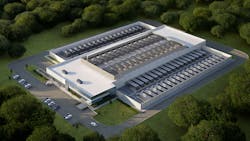CyrusOne CEO Eric Schwartz Talks Intelliscale AI Data Centers’ 300 kW Racks, And More
One of the signal moments in 2023’s inflection point “summer of AI” for the data center industry was CyrusOne’s launch in late August of its Intelliscale platform, an artificial intelligence (AI) workload-specific data center build-to-suit offering, tailored to address the rapidly growing needs of AI applications and services.
The rush of AI workloads demanding increased performance and density will require data centers with increased scale and a bespoke design. To meet this demand, in conjunction with its technology partners, CyrusOne developed Intelliscale as a cornerstone enhancement to its build-to-suit capabilities.
In announcing the platform, the company emphasized that its modular manufacturing approach to data center development enables customers to utilize a mix of liquid-to-chip cooling technology, rear door heat exchanger cooling systems, and immersion cooling advancements to achieve efficient cooling up to 300 kW per rack, even under the most demanding AI workloads.
In launching the product, CyrusOne said the Intelliscale solution "offers the ability to create a super high-density environment in a smaller building to maximize efficiencies across the board," while noting that "in some instances, existing facilities can be retrofitted to address dense AI deployments."
The build-to-suit platform is purpose-built to operate with minimal land usage, offering a custom variety of redundancy configurations. CyrusOne contends its Intelliscale data centers can occupy just 25% of the space of a typical facility, depending on application and needs.
Even as it's optimized for companies aiming to effectively scale their AI infrastructure, in addition to conserving space, depending on application, converged infrastructure savings via the Intelliscale platform may also include sustainability benefits associated with using less concrete and steel.
Data Center Frontier recently spoke with CyrusOne CEO Eric Schwartz about the Intelliscale platform and the company’s other recent activities in the North American and European data center spheres.
Data Center Frontier's Interview with CyrusOne CEO Eric Schwartz
Data Center Frontier: What are your key insights regarding CyrusOne’s Intelliscale build-to-suit offering for AI data centers?
Eric Schwartz, CEO, CyrusOne: On the land aspect, you can build these data centers more efficiently, and I feel encouraged that we've hit the right note in putting forth Intelliscale - the response from customers and the industry has been very positive.
The 300 kilowatts per rack has become a bit of a lightning rod in that announcement, but there's a lot more to building data centers for AI platforms than just getting to density. What our customers are learning and what we developed in conceiving Intelliscale is that the entire facility has to perform and be operable to artificial intelligence requirements.
CyrusOne actually has more history and experience than we give ourselves credit for in dealing with these types of engineering challenges. The opportunity within IntelliScale was for us internally to bring that expertise together into a schematic and template, and ultimately a product, that we can then present to customers, all of whom have varying requirements. To be able to present that in an integrated, replicable, somewhat standardized fashion, so that they know that we're not reinventing the wheel every time, and that they're getting the benefit of our continuous learning and improvement around how to deal with these requirements.
Our bringing it together into a consistent and cohesive framework for how to manage these types of requirements is actually accelerating the discussions with customers, because it's no longer sitting down with them and a blank piece of paper saying, tell us how you do artificial intelligence. We're positioned to say, we deal with artificial intelligence, we deal with the density, we deal with the cooling challenges.
Density is one factor, as well as the various technologies that you use to achieve that density, whether it's some combination of air or rear door heat exchangers, or liquid on chip or immersion, or others. Each of those cooling technologies brings with it a set of design considerations, and a set of operational considerations. Because it's fun and exciting to design it, and then we're going to have a groundbreaking ceremony and build it; but then on day two, you've really got to operate it. The operational discipline that goes into those various technologies and configurations is as important as knowing how to build it. IntelliScale as a product and a service is bringing those both together.
Regarding cooling technologies, it's about understanding how to adapt the design for various levels of resilience that the customer may want. Do they need the standard five nines generator backup? All those capabilities - do they need more? Do they need less? It also speaks to efficiency on space. The advantage of going much denser on power is you need less space. Is it commercially efficient to build a smaller building, or do you build a bigger building and put more in it? How do you manage the power around that, both from the utility and the grid, as well as within the building? At those densities, power distribution as well as cooling distribution are critical.
The networking technologies that are at play in artificial intelligence overlap with what you would see in cloud deployments. But being ready to engineer with the customer to support their networking architecture and topology, both within the data center and leaving, is integral to all this as well. It's all those factors together that make Intelliscale more than just a data point. But that data point is important, because whatever the power densities are now, they are rising.
I had a chance to spend time with a large chip manufacturer with some people from the team this past week, and they were testing me on how ready we were for what they saw as the increasing power densities. I explained to them how we were positioning what we were preparing for, and their response was, that's great but just so you know, the next generation of chips is going to be even denser. Whatever it is you're planning for - plan for more. Well, the Intelliscale platform is extensible beyond what we're seeing today. That's as important to customers as being able to meet their requirements now, because they also recognize that whatever they design for today is likely to evolve.
Data Center Frontier: The data center industry, as everyone knows, faces a massive power crunch. How is this year of AI inflection points going to impact the industry’s power dilemma going forward?
Eric Schwartz, CyrusOne: The power requirements are definitely growing. The cloud platforms from the hyperscalers continue to grow. I think it's important to remember ChatGPT was a milestone event in artificial intelligence. But artificial intelligence has been happening and deployed for quite some time before ChatGPT hit as a moment. ChatGPT, I think, will be looked back on as a milestone where artificial intelligence accelerated, and that translates into more power demand.
For us, securing power in the most efficient and sustainable ways is integral to the strategy we have for the company. The solution to it? It varies by location, by jurisdiction, by which grid you're on. It varies based on the policy as well. My understanding and dialogue with a lot of colleagues in the renewable industry is that through the Inflation Reduction Act, the growth in renewable power will help to address the growing demand coming from data centers and other requirements. CyrusOne has spent a lot of time with people who are developing renewable energy sources to align and link up as best we can, whether that's through PPA or other mechanisms.
The industry is evolving. I was at a conference this past week where people were talking about commercially viable fusion power, which I know has a lot of people's imagination. For the most part, I'm told that the more technological solutions, like nuclear, are five to 10 years away. So we're continuing to monitor it, and wherever possible will plug into that dialogue. But in the immediate term, where we're trying to respond to more timely demand from customers, we've got to figure out how to leverage the capabilities of the existing grids, leverage the capabilities of existing renewable sources and fit that together. But it is a site by site, city by city, circumstance by circumstance exercise.
We operate with 100% renewable power in Europe through a combination of tools, and we're targeted to get to something similar here in the US by 2030 - we're on that track. It is a multidimensional problem and takes a lot of focus and resources to attack it.
Data Center Frontier: Back to Intelliscale, in the press release immersion cooling was mentioned prominently. Is that standard for AI liquid cooling with the platform? I also wanted to ask about how many facilities are currently being planned or are in development.
Eric Schwartz, CyrusOne: I was going to say it's too early to tell about how much will be immersion versus other technologies, but I would amend that to say it's changing as we speak. Technologies that have been deployed and that we've supported for years now involve a variety of liquid cooling that's evolving to new requirements, some of which is immersion, some liquid to chip, and others.
I would say that whether it's 300 kilowatts per rack or less, the industry is going through a step change in power density, and we are supporting our customers in trying to figure out how to engineer that. Where we sit today? It’s being tested and evaluated and deployed as we speak, and it'll be a year or two or more to really know what direction or directions the industry is going to head in.
In terms of the roadmap for Intelliscale, we're looking at it on probably a 5-year or more horizon. We'll focus on the first sites right now that'll be turning up as quickly as we can build them. I would say that in our roadmap we've got, give or take, ten, maybe a few more potential sites lined up for Intelliscale, and it's got to do with customer demand and customer adoption.
But the key is ensuring that, as we get traction with customers, we're positioned to deliver. That means having developable sites and access to power at large scale. It means having the design and delivery system.
That's been one of the things that I think CyrusOne has done very well, dating back to before I joined, is building a delivery system that meets customer requirements, but goes from concept to ready for service in a very disciplined and effective way that can keep up with the volume here. Because the volumes are growing, and trying to manage each engagement as a one-off just becomes infeasible at the scale that we're talking about.
Data Center Frontier: Going back to the step change in rack power densities for AI workloads, what is that going to do to competition among hyperscalers and large colos - is it going to come down to, my 70 kW rack is as good as yours?
Eric Schwartz, CyrusOne: I'm kind of wondering where I put the crystal ball on that. From a CyrusOne perspective, there's going to be an element of this that's technical and engineering. I really like the positioning we've taken with Intelliscale, because it gives CyrusOne the opportunity to celebrate the really strong engineering and technical discipline that I think the company has, that may have been historically a little underappreciated in the market.
Our competitors are going to have to figure out what they're going to do for themselves. But I would say the acid test here is that the companies that are deploying these AI platforms are some of the world's leading technology companies. Whether it's the very large hyperscalers or smaller startups, they're similarly technologically advanced, and I expect there their ultimate criterion test for us as a company and as a supplier and partner, is going to be whether we can deliver both the engineering required to do this, and then the operations for it to actually work.
I'm both proud and confident in our ability to do that and every time we do, that builds more equity with our customers, and more trust for them to come to us for the next one. We're going to build our business on that basis and that puts the onus on us to perform and deliver. But my experience in this industry is, if you demonstrate that you can perform and deliver against both difficult technical requirements, as well as difficult environmental requirements, be it power availability, supply chain challenges and the like, that earns you the opportunity for the next project. That's where our focus is and will continue to be, and I get feedback from customers that they value that. So that's our mindset.
It's a competitive industry, but at the same time, the volumes of growth are certainly structuring the industry in such a way that I think a number of our competitors are seeing strong growth as well. That's just in the nature of just how large the volume demands are.
Data Center Frontier: We have to ask you about the planning for Cyrus One's Dublin data centers, and data centers in Germany. What's so strategic about these locations?
Eric Schwartz, CyrusOne: Dublin is a major data center market for Europe and certainly an area of high concentration for the hyperscale players. I don't have the details on exactly where the permit application in Dublin stands, but the application was for effectively another building that's adjacent to the facility that we already own in Dublin. There's clearly demand and need for more capacity in Dublin; applying for the building permit is one step in the process to being able to expand the site that we've got. We're in that type of process on sites around the world. We’ll pursue that through the processes that are required by the government there.
From my standpoint, the sooner that we can be in a position to build the next one, the better. At the same time, the environment in Dublin, both in terms of the permitting process and how power gets distributed and allocated, is a central issue in Ireland and we've got to participate in that like everyone else and see how it unfolds for us.
The Frankfurt announcement actually is a new campus that follows on the announcements we made earlier about a new campus on the east of Frankfurt in Hanau and another site that we acquired that is a multi-building site that's adjacent to our existing buildings in Frankfurt. The Frankfurt market just continues to see strong demand, both as a central point within Germany, but also serving that entire area of Europe and we're very motivated to acquire that site. It's positioned very well to connect to the grid and have power capacity to support growth, for whether it's a hyperscale customer or otherwise.
We saw a great opportunity. It's a very complex project, because the site is a former manufacturing plant that's being redeveloped and repurposed for a variety of uses, and our data center is only one of those. But again, I have a lot of confidence in our team to be able to manage and navigate a complex project that positions us very well with what would be a very large block of capacity. I think we're targeting 81 megawatts, which is a pretty substantial scale. The work is in front of us to move that forward from where it is today, which is a site undergoing redevelopment and largely empty, to ultimately a world-class data center.
Data Center Frontier: Does anyone ever ask you whether it's easier to build data centers here in North America or in Europe? Is it worthy of comparison or do the hurdles and challenges and considerations stand by themselves, no matter where they're being built?
Eric Schwartz, CyrusOne: I would say it's quite project-specific. The Frankfurt announcement that we made involves taking a portion of a larger redevelopment project, which requires a lot of coordination. We have projects underway and under construction across the US. This is where we wrestle with other challenges, from ensuring that we've got appropriate fiber axis built out and adequate connectivity if it's a new site. There are always challenges around supply chain, whether it's Europe or the US. Are we getting equipment delivered on time? These construction projects are amazing logistics coordination exercises.
I would say one thing that's absolutely common to all of them is a focus on safety. The scale of these projects and the number of people involved in the construction makes it just absolutely essential that we bring a safety ethos, because there's no “try again” when it comes to safety. Knock on wood, but we've had very good success in implementing very rigorous safety elements across all of the sites and that's essential.
It's more of a commonality than a difference, but local jurisdictions are much more active in reviewing new data center construction and projects. This is worldwide, and so our approach and model had to evolve to keep up with that and make sure that we're engaging with community constituencies as we develop these projects, in a way that really wasn't a concern years ago.
Every project inevitably presents challenges, and our business is about overcoming those.
Data Center Frontier: What is the consideration of AI hardware such as GPUs in the Intelliscale build-to-suit data center offering?
Eric Schwartz, CyrusOne: The chips and the equipment that go into these facilities are customer equipment, so we're working with them to understand what their specifications are, but we're not sourcing GPUs or that type of component. It is, pardon the pun, a hot topic, but it's really our customers who are deploying the IT, whether it's GPUs or other types of hardware.
But I would add, one thing that's changed in our industry over the last couple years is that we now certify data centers, and this will be true for Intelliscale, as well as being capable or ready for various types of high performance equipment, including GPUs. That's something that we've developed and working with the hardware providers over the last couple years, it takes a couple steps out of the process, just by being able to say we're certified for this GPU or other equipment. That's been a very worthwhile investment for us.
Data Center Frontier: The last question is about the major data center markets and locations in North America. Obviously, everybody knows that the two biggest ones are Northern Virginia and Silicon Valley. But what’s your perception and thinking on all the other popular North American markets for data centers?
Eric Schwartz, CyrusOne: I do think there is a tiring of markets here in the US in Northern Virginia, Phoenix, Greater Dallas, Chicago, Silicon Valley, all land in that top tier. How a market like the Pacific Northwest works, which has very large volumes of capacity, but is serving a different type of requirement than what you would serve out in Chicago, is part of the question.
In broad terms, the customers continue to tell us that they expect the infrastructure to stay clustered in these primary markets. Sometimes it's about latency; sometimes it's just about being able to get scale across multiple facilities, rather than having them spread all over the place. Sometimes, it definitely follows where government policy is more accommodating versus unwelcoming.
A number of states have tax incentives to attract data center development; states that don't have those programs, in general terms, I don't see much if any development. I think that's a core trend that's going to persist, because the data centers themselves are a tax base and are contributing to the local infrastructure.
The potential sales tax and other things on top of that are material factors in making these types of decisions, and both we as developers and our customers as people who deploy this infrastructure are going to accept and adopt the incentives that are out there, and for the states that choose not to have those types of programs, you can already see the effects of that.
I do think there will continue to be these tier one markets that are hubs - and they're going to continue to grow, provided that the power and the infrastructure surrounding them can keep up. It's exciting stuff. If you're not energized and feeling the momentum of the industry that we're in, then you're probably not paying attention. It’s an exciting time to be here.
About the Author
Matt Vincent
A B2B technology journalist and editor with more than two decades of experience, Matt Vincent is Editor in Chief of Data Center Frontier.




